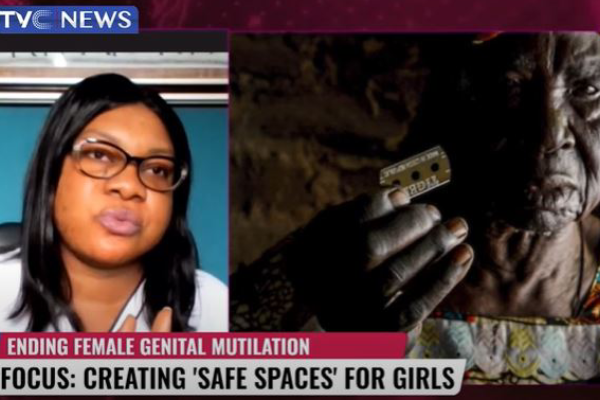Despite the criminalization of female genital mutilation, commonly known as female circumcision, many Nigerians are still involved in this barbaric practice, subjecting young girls to excruciating pain and trauma.
A recent study sponsored by the center for Population and Reproductive Health disclosed that, Ekiti State records the highest number of cases of female circumcision to protect the girl child and create an environment where they will feel safe, the House of Representatives is seeking stiffer punishment for persons involved in female circumcision.
[wonderplugin_video iframe=”https://youtu.be/T2765TFI6dA” lightbox=0 lightboxsize=1 lightboxwidth=960 lightboxheight=540 autoopen=0 autoopendelay=0 autoclose=0 lightboxtitle=”” lightboxgroup=”” lightboxshownavigation=0 showimage=”” lightboxoptions=”” videowidth=600 videoheight=400 keepaspectratio=1 autoplay=0 loop=0 videocss=”position:relative;display:block;background-color:#000;overflow:hidden;max-width:100%;margin:0 auto;” playbutton=”https://www.tvcnews.tv/wp-content/plugins/wonderplugin-video-embed/engine/playvideo-64-64-0.png”]
A bill seeking a four year jail term and a fine of 200,000 naira has passed second reading at the Green Chamber.
Executive Director, Hacey Health Initiative, Rhoda Robinson says it’s great that we are still talking about FGM, because it still happens in today’s society in the 21st century.
She noted that when we have laws that are caught up to the pace of human rights and the rights to live free from violence and torture, even under the guise of tradition, we need to recognise that, that is a step in the right direction.
Speaking on the decision by the House of Representative on the penalty associated with the acts of female genital mutilation, Mrs Robinson stated that in her opinion, she does not think it is enough to serve as a strong deterrence for people who commit female genital mutilation.
She added that as different states have different laws, the VAP Act as well contains these laws that determine what happens if you practice a female genital mutilation.
“If you advise someone to take your daughter for female genital mutilation, or you support the process in any form, the penalty attached to it is too little.
“When you compare it with the trauma and the negative effects that come from female genital mutilation, we have both short term and long term negative effects, which could range from physical issues, reproductive issues to mental health issues as well.
According to her, putting the price of 200,000 naira on FGM as a deterrent is something that a lot of people would not see as so much as a way to take it as a serious crime. But a jail term of one to two years or one to four years is a strong deterrent but needs to be increased to show that we are that we are really serious about what we are saying.
Mrs Robinson stated that we have the laws but these provisions need to be strengthened so that more people will understand how serious of a crime it is, not just against the girl, but against the society in itself.
“She said the option of fine is on itself saying that you can get away with the slap on the wrist, and looking at serious jail time, you’re talking from five years and above, so that people understand that if they are going to affect the trajectory of a girl’s life, they should know that a large percentage or a large portion of their own life would be put as risk as well. And it is not just about the people who cut the girls that’s the Excisers or the traditional cutters or where we have it in the medical, in some medical fields as well, It is about people who actually take their daughters for female genital mutilation.
“It’s about families who support the process as well, that if you are found to support this act, you also are liable or unlikely to also serve the time. So that will send a stronger message to the community that this is no longer tolerated on any means and it is not just a slap on the risk punishments that you get if you are caught.
Talking about the dangers of FGM, female genital mutilation and highlighting the risk, Mrs Robinson stated that surprisingly, a lot of young women are survivors of hemogenic mutilation but do not know that they are survivors because they’ve been told that it’s a normal part of life, So they do not recognise that they are suffering from some traumatic experiences.
Looking at the short term, in the immediate time, when the procedure is done, the girl is at risk of severe bleeding, at risk of the infection, risk of permanent damage to that area, to the reproductive, to the urinary tract, she’s at risk of those damages and that infection.
In the long term, this can cause severe reproductive health issues in some types of female genital mutilation where the entire outer genital area is removed and the area is sown shut, they will go through immense pain.
“There is no anesthetics anesthesia that is given to the girl when she’s going through that pain and when it’s being cut, either when she is getting married or when she’s given birth, the area has to be open again and this puts the person at risk of medical issues like kelloid, reproductive issues, obstetric fistula, which is one of the medical issues that comes from female genital mutilation.
“And because they are both the severe aspects of female genital mutilation as well as the not so severe versions, which is most common around southwest Nigeria, a lot of people do not still see that this is a serious problem. They tend to get away with this.
” Women lose sexual feelings in that area when female genital mutilation has occurred, and this affects their normal life.
“Even as young women, as married women, when they get into families and when it’s time for reproduction, it causes friction between the man and the woman, the wife, the husband and the wife when it’s time for sexual intercourse.
“These are some of the issues that need to be brought to the forefront as a lot of women do not talk about this enough.





